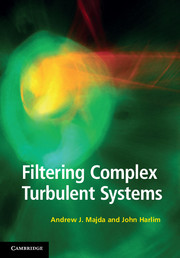Book contents
- Frontmatter
- Contents
- Preface
- 1 Introduction and overview: Mathematical strategies for filtering turbulent systems
- Part I Fundamentals
- 2 Filtering a stochastic complex scalar: The prototype test problem
- 3 The Kalman filter for vector systems: Reduced filters and a three-dimensional toy model
- 4 Continuous and discrete Fourier series and numerical discretization
- Part II Mathematical guidelines for filtering turbulent signals
- Part III Filtering turbulent nonlinear dynamical systems
- References
- Index
2 - Filtering a stochastic complex scalar: The prototype test problem
from Part I - Fundamentals
Published online by Cambridge University Press: 05 March 2012
- Frontmatter
- Contents
- Preface
- 1 Introduction and overview: Mathematical strategies for filtering turbulent systems
- Part I Fundamentals
- 2 Filtering a stochastic complex scalar: The prototype test problem
- 3 The Kalman filter for vector systems: Reduced filters and a three-dimensional toy model
- 4 Continuous and discrete Fourier series and numerical discretization
- Part II Mathematical guidelines for filtering turbulent signals
- Part III Filtering turbulent nonlinear dynamical systems
- References
- Index
Summary
As discussed in the introductory chapter, the scientific issue in real-time prediction problems is to provide a statistical estimate of a true state given that the nature of the physical process is chaotic and given the fact that the measurements (observations) are inaccurate or sometimes even unavailable. Essentially, at every time when observations become available, one chooses the best estimate of the true state by accounting for the prior forecasts and these observations. There are two challenges for improving the real-time prediction of a turbulent signal with multiple scales: the first is to improve the model which suffers from model error since we don't yet understand the underlying physical processes. Even if we do, we cannot realize these processes at every temporal or spatial scale with our limited computing power. Thus, the second challenge is to provide efficient and accurate strategies that meet this practical constraint.
In this chapter, we derive the one-dimensional Kalman filter formula which is a specific analytical solution of the Bayesian update in a simplified setting. As mentioned in the introductory chapter, this is an important test problem for filtering multi-scale turbulent systems and this point of view is emphasized here. We show the numerical results of filtering a one-dimensional complex Ornstein–Uhlenbeck process. We then discuss the conditions for filtering stability and compute the asymptotic off-line variables in closed form for the one-dimensional Kalman filter.
- Type
- Chapter
- Information
- Filtering Complex Turbulent Systems , pp. 15 - 29Publisher: Cambridge University PressPrint publication year: 2012



